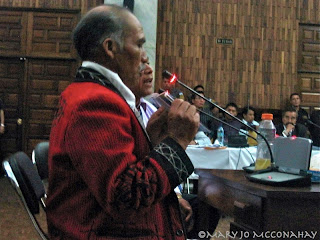 |
| Standing: Witness, left. General, right. |
Today is the 31st anniversary of the military coup that brought to power Gen. Efrain Ríos Montt, now on trial for genocide and crimes against humanity.
 Since Tuesday, Maya Ixil witnesses have been testifying under oath, relating their experience a few feet from the defense table where the general sits, fit-looking at age 86.
Since Tuesday, Maya Ixil witnesses have been testifying under oath, relating their experience a few feet from the defense table where the general sits, fit-looking at age 86.
"Put that away!" ordered Judge Jazmín Barrios, when Juan López Mateo, 68, took a small photo album from his pocket and opened it to display pictures of two children.
"But this is my proof," said Lopez, sounding hapless.
Wearing a red woolen jacket with black abstract designs, Lopez testified that he returned from working a cornfield late on a September morning, 1982, to find soldiers occupying his village in the northern highlands. At gunshots, he hid. Around three in the afternoon, soldiers gone, Lopez said entered his house to find his wife and two children dead. The five-year old still had the rope around his neck with which he had been strangled; the two-year old's head was beaten in as if by a stick.
"My heart hurts," Lopez said, more than thirty years after the event.
Another witness, also a native Ixil Maya, spoke at great length in fluent Spanish. The judge, apparently, considered that he went beyond the answer to the question put to him, ordering him to respond precisely only in his native Ixil tongue through the designated court interpreter.
How much Judge Barrios is able to keep witnesses from giving voice to the torrent of memory and indignation unleashed by the trial, possibly at the expense of an orderly process, is an open question. Dozens more are set to testify.
The United States government supported the 18-month long Ríos-Montt regime in its anti-insurgency campaign, part of a 36-year civil conflict. In a 1982 visit to Guatemala City, Pres. Ronald Reagan declared the general was "getting a bum rap." A United Nations-sponsored Truth Commission estimated some 200,000 persons died during the war that ended in 1996.
"My heart hurts," Lopez said, more than thirty years after the event.
Another witness, also a native Ixil Maya, spoke at great length in fluent Spanish. The judge, apparently, considered that he went beyond the answer to the question put to him, ordering him to respond precisely only in his native Ixil tongue through the designated court interpreter.
How much Judge Barrios is able to keep witnesses from giving voice to the torrent of memory and indignation unleashed by the trial, possibly at the expense of an orderly process, is an open question. Dozens more are set to testify.
 |
| Witness, left. Prosecution team, seated at table. |
The United States government supported the 18-month long Ríos-Montt regime in its anti-insurgency campaign, part of a 36-year civil conflict. In a 1982 visit to Guatemala City, Pres. Ronald Reagan declared the general was "getting a bum rap." A United Nations-sponsored Truth Commission estimated some 200,000 persons died during the war that ended in 1996.
 |


